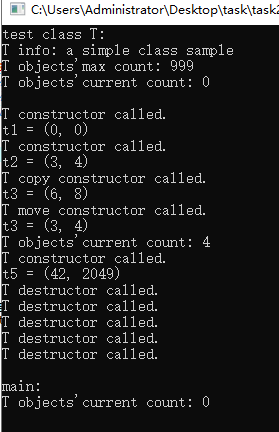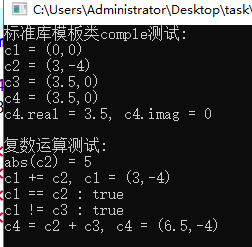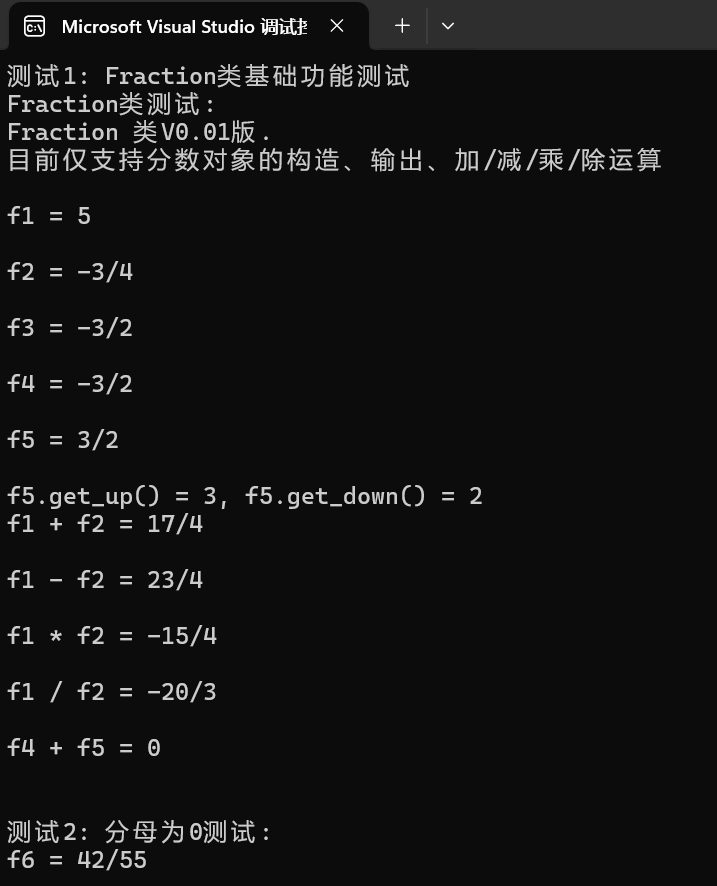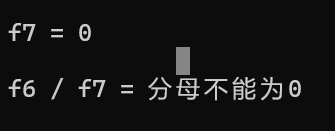实验2 类和对象_基础编程1
实验1
task1.cpp

t.h: #pragma once #include <string> // 类T: 声明 class T { // 对象属性、方法 public: T(int x = 0, int y = 0); // 普通构造函数 T(const T &t); // 复制构造函数 T(T &&t); // 移动构造函数 ~T(); // 析构函数 void adjust(int ratio); // 按系数成倍调整数据 void display() const; // 以(m1, m2)形式显示T类对象信息 private: int m1, m2; // 类属性、方法 public: static int get_cnt(); // 显示当前T类对象总数 public: static const std::string doc; // 类T的描述信息 static const int max_cnt; // 类T对象上限 private: static int cnt; // 当前T类对象数目 // 类T友元函数声明 friend void func(); }; // 普通函数声明 void func(); t.cpp: // 类T: 实现 // 普通函数实现 #include "t.h" #include <iostream> #include <string> using std::cout; using std::endl; using std::string; // static成员数据类外初始化 const std::string T::doc{"a simple class sample"}; const int T::max_cnt = 999; int T::cnt = 0; // 对象方法 T::T(int x, int y): m1{x}, m2{y} { ++cnt; cout << "T constructor called.\n"; } T::T(const T &t): m1{t.m1}, m2{t.m2} { ++cnt; cout << "T copy constructor called.\n"; } T::T(T &&t): m1{t.m1}, m2{t.m2} { ++cnt; cout << "T move constructor called.\n"; } T::~T() { --cnt; cout << "T destructor called.\n"; } void T::adjust(int ratio) { m1 *= ratio; m2 *= ratio; } void T::display() const { cout << "(" << m1 << ", " << m2 << ")" ; } // 类方法 int T::get_cnt() { return cnt; } // 友元 void func() { T t5(42); t5.m2 = 2049; cout << "t5 = "; t5.display(); cout << endl; } task1.cpp: #include "t.h" #include <iostream> using std::cout; using std::endl; void test(); int main() { test(); cout << "\nmain: \n"; cout << "T objects'current count: " << T::get_cnt() << endl; } void test() { cout << "test class T: \n"; cout << "T info: " << T::doc << endl; cout << "T objects'max count: " << T::max_cnt << endl; cout << "T objects'current count: " << T::get_cnt() << endl << endl; T t1; cout << "t1 = "; t1.display(); cout << endl; T t2(3, 4); cout << "t2 = "; t2.display(); cout << endl; T t3(t2); t3.adjust(2); cout << "t3 = "; t3.display(); cout << endl; T t4(std::move(t2)); cout << "t3 = "; t4.display(); cout << endl; cout << "T objects'current count: " << T::get_cnt() << endl; func(); }

问题1:不能
![]()
出错原因可能是类外未声明函数。
问题2:普通构造函数是带有参数的构造函数,允许用户传递参数以自定义对象的初始化。
拷贝构造函数用于从另一个已存在的对象创建新对象。它通常用于复制另一个对象的属性值,而不共享原始对象的数据。
移动构造函数用于从即将销毁的临时对象转移资源到新对象。它通常用于避免不必要的资源复制,并提高性能。
析构函数:当对象的生命周期结束时(例如,对象离开作用域、被删除等),会自动调用析构函数。
问题3:不能正常运行。
实验2
task2.cpp

Complex.h: #pragma once #include<iostream> using namespace std; class Complex { public: Complex(); Complex(double a); Complex(double a,double b); Complex(const Complex &c); static string doc; const double get_real(); const double get_imag(); const void add(const Complex &c); friend Complex add(const Complex &a,const Complex &b); friend bool is_equal(const Complex &a, const Complex &b); friend bool is_not_equal(const Complex &a, const Complex &b); friend void output(const Complex &c); friend double abs(const Complex &c); private: double real, imag; }; Complex.cpp: #include<iostream> #include"Complex.h" #include<cmath> using namespace std; string Complex::doc = "a simplified Complex class"; Complex::Complex(double a = 0, double b = 0) { real = a; imag = b; } Complex::Complex() { real = 0; imag = 0; } Complex::Complex(double a = 0) { real = a; imag = 0; } const double Complex::get_real() { return Complex::real; } const double Complex::get_imag(){ return Complex::imag; } Complex::Complex(const Complex &c) { real = c.real; imag = c.imag; } double abs(const Complex& c) { double t =pow((c.real * c.real + c.imag * c.imag),0.5); return t; } void output(const Complex &c) { if (c.imag < 0) { cout << c.real<< c.imag << "i" << endl; } else { cout << c.real << "+" << c.imag << "i" << endl; } } bool is_equal(const Complex& a, const Complex& b) { if (a.real == b.real && a.imag == b.imag) { return true; } else { return false; } } bool is_not_equal(const Complex & a, const Complex & b) { if (a.real == b.real && a.imag == b.imag) { return false; } else { return true; } } Complex add(const Complex& a, const Complex& b) { return Complex::Complex(a.real + b.real,a.imag + b.imag); } const void Complex::add(const Complex& c) { Complex::real += c.real; Complex::imag += c.imag; } main: #include"Complex.h" #include <iostream> using std::cout; using std::endl; using std::boolalpha; void test() { cout << "类成员测试: " << endl; cout << Complex::doc << endl; cout << endl; cout << "Complex对象测试: " << endl; Complex c1; Complex c2(3, -4); const Complex c3(3.5); Complex c4(c3); cout << "c1 = "; output(c1); cout << endl; cout << "c2 = "; output(c2); cout << endl; cout << "c3 = "; output(c3); cout << endl; cout << "c4 = "; output(c4); cout << endl; cout << "c4.real = " << c4.get_real() << ", c4.imag = " << c4.get_imag() << endl; cout << endl; cout << "复数运算测试: " << endl; cout << "abs(c2) = " << abs(c2) << endl; c1.add(c2); cout << "c1 += c2, c1 = "; output(c1); cout << endl; cout << boolalpha; cout << "c1 == c2 : " << is_equal(c1, c2) << endl; cout << "c1 != c3 : " << is_not_equal(c1, c3) << endl; c4 = add(c2, c3); cout << "c4 = c2 + c3, c4 = "; output(c4); cout << endl; } int main() { test(); }

实验3
task3.cpp

#include <iostream> #include <complex> using std::cout; using std::endl; using std::boolalpha; using std::complex; void test() { cout << "标准库模板类comple测试: " << endl; complex<double> c1; complex<double> c2(3, -4); const complex<double> c3(3.5); complex<double> c4(c3); cout << "c1 = " << c1 << endl; cout << "c2 = " << c2 << endl; cout << "c3 = " << c3 << endl; cout << "c4 = " << c4 << endl; cout << "c4.real = " << c4.real() << ", c4.imag = " << c4.imag() <<endl; cout << endl; cout << "复数运算测试: " << endl; cout << "abs(c2) = " << abs(c2) << endl; c1 += c2; cout << "c1 += c2, c1 = " << c1 << endl; cout << boolalpha; cout << "c1 == c2 : " << (c1 == c2) << endl; cout << "c1 != c3 : " << (c1 != c3) << endl; c4 = c2 + c3; cout << "c4 = c2 + c3, c4 = " << c4 << endl; } int main() { test(); }

对比:标准库中的+运算和输出更为简单。
启发:标准库较实验2写的代码更为简单易懂,更易于操作者理解和使用,而自己写的库由于个人原因,有些代码可能导致多人操作时操作者产生歧义或不理解,而标准库则通俗易懂,一般不会遇到这种情况。
实验4
task4.cpp

Fraction.h: #pragma once #include<iostream> #include<cmath> using namespace std; class Fraction { public: static string doc; Fraction(int a); Fraction(int a, int b); Fraction(const Fraction& f); const int get_up(); const int get_down(); const Fraction negative(); friend void output(const Fraction& f); friend Fraction add(const Fraction& f1, const Fraction& f2); friend Fraction sub(const Fraction& f1, const Fraction& f2); friend Fraction mul(const Fraction& f1, const Fraction& f2); friend Fraction div(const Fraction& f1, const Fraction& f2); private: int up, down; }; Fraction.cpp: #include<iostream> #include"Fraction.h" #include<cmath> using namespace std; string Fraction::doc = "Fraction 类V0.01版.\n目前仅支持分数对象的构造、输出、加/减/乘/除运算"; Fraction::Fraction(int a) { up=a; down=1; } Fraction::Fraction(int a,int b){ int i; int min; if (abs(a) >= abs(b)) { min = b; } else { min = b; } for (i = 1; i <= min; i++) { if (a % i == 0 && b % i == 0) { a /= i; b /= i; } } up = a; down = b; } const int Fraction::get_up(){ return up; } const int Fraction::get_down(){ return down; } Fraction::Fraction(const Fraction &f){ up=f.up; down=f.down; } void output(const Fraction &f){ if(f.up==0&&f.down!=0){ cout<<0<<endl; } else if(f.down==0){ cout<<"分母不能为0"<<endl; } else if((f.down<0&&f.up>0)||(f.up<0&&f.down>0)){ cout<<"-"<<abs(f.up)<<"/"<<abs(f.down)<<endl; } else if (f.up != 0 && f.down == 1) { cout << abs(f.up)<<endl; } else if (f.up == f.down) { cout << 1 << endl; } else{ cout<<abs(f.up)<<"/"<<abs(f.down)<<endl; } } const Fraction Fraction::negative() { return Fraction(-up, down); } Fraction add(const Fraction& f1, const Fraction& f2) { int a, b; a = f1.up * f2.down + f1.down * f2.up; b = f1.down * f2.down; return Fraction(a, b); } Fraction sub(const Fraction& f1, const Fraction& f2) { int a, b; a = f1.up * f2.down-f1.down * f2.up; b = f1.down * f2.down; return Fraction(a, b); } Fraction mul(const Fraction& f1, const Fraction& f2) { int a, b; a = f1.up * f2.up; b = f1.down * f2.down; return Fraction(a, b); } Fraction div(const Fraction& f1, const Fraction& f2) { int a, b; a = f1.up * f2.down; b = f1.down * f2.up; return Fraction(a, b); } task4.cpp: #include "Fraction.h" #include <iostream> using std::cout; using std::endl; void test1() { cout << "Fraction类测试: " << endl; cout << Fraction::doc << endl << endl; Fraction f1(5); Fraction f2(3, -4), f3(-18, 12); Fraction f4(f3); cout << "f1 = "; output(f1); cout << endl; cout << "f2 = "; output(f2); cout << endl; cout << "f3 = "; output(f3); cout << endl; cout << "f4 = "; output(f4); cout << endl; Fraction f5(f4.negative()); cout << "f5 = "; output(f5); cout << endl; cout << "f5.get_up() = " << f5.get_up() << ", f5.get_down() = " << f5.get_down() << endl; cout << "f1 + f2 = "; output(add(f1, f2)); cout << endl; cout << "f1 - f2 = "; output(sub(f1, f2)); cout << endl; cout << "f1 * f2 = "; output(mul(f1, f2)); cout << endl; cout << "f1 / f2 = "; output(div(f1, f2)); cout << endl; cout << "f4 + f5 = "; output(add(f4, f5)); cout << endl; } void test2() { Fraction f6(42, 55), f7(0, 3); cout << "f6 = "; output(f6); cout << endl; cout << "f7 = "; output(f7); cout << endl; cout << "f6 / f7 = "; output(div(f6, f7)); cout << endl; } int main() { cout << "测试1: Fraction类基础功能测试\n"; test1(); cout << "\n测试2: 分母为0测试: \n"; test2(); }


实验5
task5.cpp

account.h: #pragma once class SavingAccount { private: int id; double balance; double rate; int lastDate; double accumulation; static double total; void record(int date, double amout); double accumulate(int date)const { return accumulation + balance * (date - lastDate); } public: SavingAccount(int date, int id, double rate); int getId()const { return id; } double getBalance() const { return balance; } double getRate()const { return rate; } static double getTotal() { return total; } void deposit(int date, double amount); void withdraw(int date, double amount); void settle(int date); void show() const; }; account.cpp: #include"account.h" #include<cmath> #include<iostream> using namespace std; double SavingAccount::total = 0; SavingAccount::SavingAccount(int date, int id, double rate) : id(id), balance(0), rate(rate), lastDate(date), accumulation(0) { cout << date << "\t#" << id << "is created" << endl; } void SavingAccount::record(int date, double amount) { accumulation = accumulate(date); lastDate = date; amount = floor(amount * 100 + 0.5) / 100; balance += amount; total += amount; cout << date << "\t#" << id << "\t" << amount << "\t" << balance << endl; } void SavingAccount::deposit(int date, double amount) { record(date, amount); } void SavingAccount::withdraw(int date, double amount) { if (amount > getBalance()) cout << "Error:not enough money" << endl; else record(date, -amount); } void SavingAccount::settle(int date) { double interest = accumulate(date) * rate / 365; if (interest != 0) record(date, interest); accumulation = 0; } void SavingAccount::show()const { cout << "#" << id << "\tBalance:" << balance; } 5_11.cpp: #include"account.h" #include<iostream> using namespace std; int main(){ SavingAccount sa0(1, 21325302, 0.015); SavingAccount sa1(1, 58320212, 0.015); sa0.deposit(5, 5000); sa1.deposit(25, 10000); sa0.deposit(45, 5500); sa1.withdraw(60, 4000); sa0.settle(90); sa1.settle(90); sa0.show(); cout << endl; sa1.show(); cout << endl; cout << "Total:" << SavingAccount::getTotal() << endl; return 0; }

思考:该程序基本功能较为完善,能执行简单的银行账户管理操作,就是输出结果不够直观,可以增加使输出结果更为直观明了的代码来进行完善,否则可能会造成使用者看不懂输出结果的现象。




